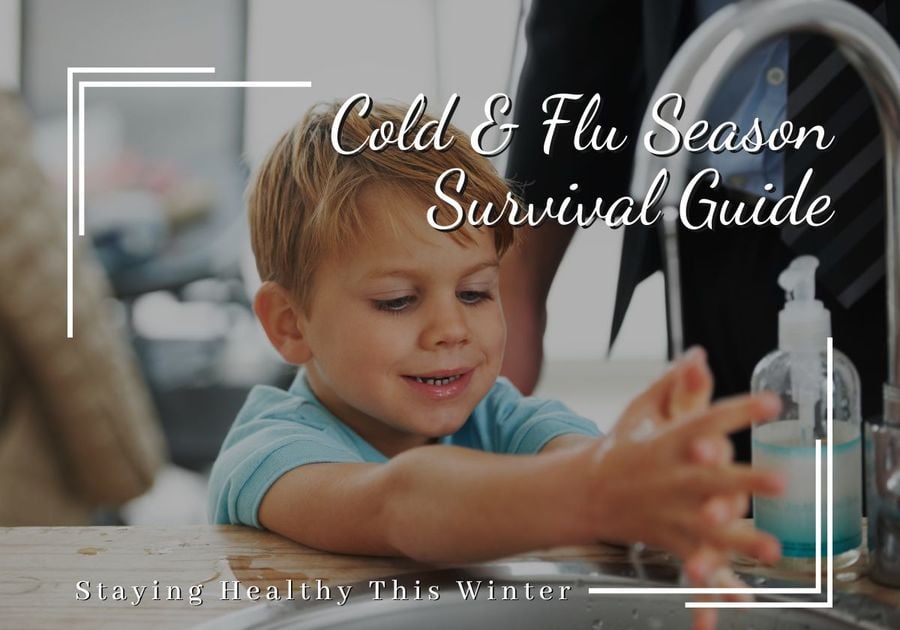Winter in the Southern Tier brings with it the inevitable: cold and flu season. While these illnesses can be unpleasant, there are steps you can take to minimize your family’s risk and effectively manage symptoms. Here's your guide to staying healthy this winter:
1. Prevention is Key:
- Wash Those Hands: This is the single most effective way to prevent the spread of germs. Wash your hands frequently with soap and water for at least 20 seconds, especially after using the bathroom, before eating, and after blowing your nose or coughing.
- Healthy Habits:
- Eat a Balanced Diet: A diet rich in fruits, vegetables, and whole grains strengthens your immune system.
- Stay Hydrated: Drink plenty of fluids, especially water, to help flush out toxins and keep your mucous membranes moist.
- Get Enough Sleep: Sleep is crucial for immune function.
- Newborns (0-3 months): 14-17 hours, including naps
- Infants (4-12 months): 12-16 hours, including naps
- Toddlers (1-2 years): 11-14 hours, including naps
- Preschoolers (3-5 years): 10-13 hours, including naps
- School-aged children (6-13 years): 9-12 hours
- Teenagers (14-17 years): 8-10 hours
- Adults (18+): 7-9 hours
- Vaccination:
- Flu Shot: The flu vaccine is the best way to protect your family from influenza.
- Consider Other Vaccines: Depending on age and risk factors, consider vaccines for RSV, pneumonia, and whooping cough.
2. Managing Symptoms:
- Over-the-Counter Medications: For fever, pain, and congestion, over-the-counter medications like acetaminophen or ibuprofen can provide relief. Always follow the recommended dosage and call us (607-777-9475) if you have any concerns.
- Rest: When you're sick, your body needs rest to recover. Get plenty of sleep and avoid strenuous activity.
- Soothe Sore Throats: Gargle with warm salt water, drink warm tea with honey, or use lozenges to soothe a sore throat.
- Humidify the Air: Using a humidifier can help loosen mucus and ease congestion.
3. When to See a Doctor:
- High Fever: If your fever is 103°F (39.4°C) or higher in adults, or 104°F (40°C) or higher in children.
- Difficulty Breathing: If you're experiencing shortness of breath, wheezing, or chest pain.
- Severe Cough: If your cough is producing green or yellow mucus, or if you're coughing up blood.
- Dehydration: Signs of dehydration include dizziness, decreased urination, and dry mouth.
- Worsening Symptoms: If your symptoms are not improving or are getting worse despite home care.
Remember:
- Stay home if you're sick: This helps prevent the spread of illness to others.
- Cover your coughs and sneezes: Use a tissue or cough/sneeze into your elbow.
- Disinfect frequently touched surfaces: This includes doorknobs, countertops, toys, and phones.
By following these tips, you can significantly reduce your family’s risk of getting sick this winter and effectively manage any illnesses that may arise.
Disclaimer: This article is for informational purposes only and does not constitute medical advice. Always consult with your pediatrician at Tier Pediatrics for any health concerns.
We hope this guide helps you stay healthy and happy this winter!
This article is sponsored by the Tier Pediatrics, a valued sponsor of Macaroni KID Binghamton. We appreciate your support in reviewing our sponsors' articles and hope that their offerings are useful for you and your family.
Macaroni KID Binghamton is run by a local mom and this website is supported solely by our local sponsors. If you would like to join our network of family-friendly businesses and connect with local parents in Binghamton, Johnson City, Vestal, Apalachin, Owego, and beyond, please reach out and learn how you can share your offerings with our readers!
 |  |  |



